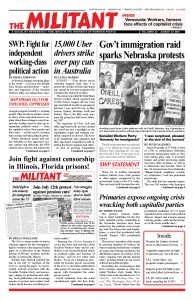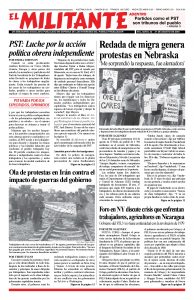August 30, 1993
REDWOOD FALLS, Minnesota — Gene Swoboda, who farms the same rich land his great-grandfather homesteaded here in southwestern Minnesota in the 1880s, expresses concern as he watches wheat roll under the blades of his 12-year-old Case combine.
The $6.2 billion flood relief bill recently passed in Washington, he says, “is a drop in the bucket for the farmer.”
It favors the largest, wealthiest farmers. “Those with bigger acreage get bigger money,” Swoboda says.
Some $2.2 billion in the package is set aside to compensate farmers for crop loss, a figure Swoboda and many other working farmers say will not cover the cost of inputs — seed, fertilizer, herbicide, and fuel — let alone make up for lost income. Farmers fear that a likely early frost will devastate harvests of crops planted late because of rains and flooding.
August 30, 1968
As the presidential candidate of the Socialist Workers Party, I [Fred Halstead] unequivocally condemn the brutal occupation of Czechoslovakia and the suppression of its reforms by the Kremlin and its stooges.
The invasion by Moscow is a criminal indefensible deed. The action violates the independence of a small nation and tramples on its right to self-determination.
Moscow’s military interference can no more be justified by false claims of defending the interests of socialism than Washington’s intervention in Vietnam is justified by its pretext of protecting “freedom.”
Indeed the Soviet invasion of Czechoslovakia directly injures the Vietnamese revolution since it is being exploited by the U.S. imperialists and their allies to sanction the continuation of their war against the Vietnamese people.
August 28, 1943
Drastic sanctions against striking unions and individual strikers were decreed by President Roosevelt in an executive order issued on August 16. Penalties to be imposed against unions when the government seizes struck plants include suspension or denial of union security provisions. Individual strikers may be drafted into the armed forces or blacklisted in industry.
Roosevelt wrote to William H. Davis, War Labor Board chairman, emphasizing that the Smith-Connally Act provides for the criminal prosecution of strikers in industries taken over by the government. Thirty Pennsylvania coal miners are now being prosecuted under this Act.
The WLB has threatened striking newspaper drivers in New York City with “severe penalties” and has asked the bosses for the names of employees failing to return to work.

